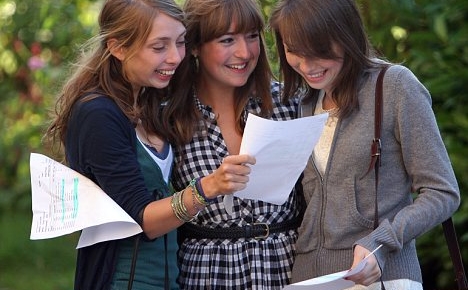A-level evaluations have edged as the year progressed, as understudies in England, Wales and Northern Ireland get their results.
There has been a slight fall in A* and An evaluations and the pass rate is down without precedent in excess of 30 years.
Anyhow there are a record number of college spots accessible and understudies could in any case get places regardless of the possibility that they miss their evaluations.
Training Secretary Nicky Morgan says the legislature is “lifting the top on desire”.
Exam authorities say the consequences of this present year’s A-levels are extensively “steady”. Be that as it may for the third progressive year the A* and An evaluations have fallen somewhat – down from 26.3% to 26%.

There were likewise negligible falls in the extent of entrances in the A* to B grades. Be that as it may the exceptionally most astounding A* grade has climbed from 7.6% to 8.2%.
Seeking understudies
For school leavers wanting to go to college, this could be a curiously decent year to apply, with a “purchaser’s business sector” in which colleges are contending to pull in understudies.
An understudy reaching the BBC had accomplished two C evaluations and a D, however had still picked up a college place for which the first offer had been three evaluation Bs.
It could likewise mean understudies who have attained higher evaluations than anticipated “exchanging up”.
Umar Burhanudin, an understudy at City and Islington College, attained two evaluations As and an A* and says he is going to look for a “higher-positioning college”.
There are an additional 30,000 college places accessible and it is normal that surprisingly in excess of 500,000 spots will be distributed for courses this pre-winter.
Colleges keep on haing an adaptability over selecting understudies who accomplish AAB evaluations or better.
The Ucas confirmations administration says that so far 396,990 understudies have been acknowledged on degree courses at UK colleges – up 3% contrasted and this point a year ago.
Colleges Minister Greg Clark says the extension in spots is an “essential wellspring of social versatility”.
The Joint Council for Qualifications, issuing the results, said there was a pattern for more understudies to take alleged “encouraging subjects” at A-level, for example, maths and material science, which can help college applications.
Maths is currently the most prevalent A-level subject.
At the same time there have been huge falls in the take-up of subjects outside this standard gathering, for example, a 47% drop in basic deduction and 24% less passages by and large studies.
Scratch Foskett, bad habit chancellor of Keele University, says understudies will have a greater number of choices than in earlier years, regardless of the possibility that they don’t get their normal evaluations.
“More understudies are prone to be acknowledged into their first decision, regardless of the fact that their evaluations are somewhat lower than colleges asked for,” said Prof Foskett.
More adaptability
“Numerous colleges that have plans for development will be utilizing in the not so distant future to grow their numbers, so will be quick to acknowledge understudies that may have been rejected in earlier years.”
The Ucas affirmations administration says beginning figures demonstrate a 2% increment in understudies getting their first decision place.
The Russell Group of heading colleges has shown that there will be more adaptability than normal.
“Some Russell Group colleges may in any case have places accessible in a few subjects for understudies who have shown improvement over expected,” said the bunch’s executive general, Wendy Piatt.
“There may additionally be places accessible for exceedingly qualified understudies who have barely passed up a major opportunity for their first decision.”
A larger number of colleges than standard are relied upon to partake in the clearing procedure, which matches understudies searching for a spot with any accessible courses.
For understudies questioning the exactness of their evaluations, the Information Commissioner’s Office says they have a right to perceive how their exams were checked. This is an expansion to the exam sheets’ bids process.
This present year’s results incorporated the first A-level evaluations from a free school, the London Academy of Excellence, with 43% of understudies attaining top evaluations of A* and A.
Work’s shadow training secretary Tristram Hunt said he would scrap the legislature’s plan to uproot the connection in the middle of AS and A-levels. This de-coupling of the exams would constrain youngsters’ “chance to understand their maximum capacity”, said Mr Hunt.
The CBI’s chief general John Cridland said after such a great amount of concern over evaluation expansion “we ought not pummelled ourselves if evaluations and general leaves don’t go behind every last year”.
At the same time Mr Cridland raised worries about the proceeding with decrease in understudies taking cutting edge dialects.
Head instructors’ pioneer Brian Lightman said this current year’s results were a “genuine uplifting news story”.
“It demonstrates how hard understudies and educators have worked notwithstanding changes to exams to attain comes about that are as high as ever.”